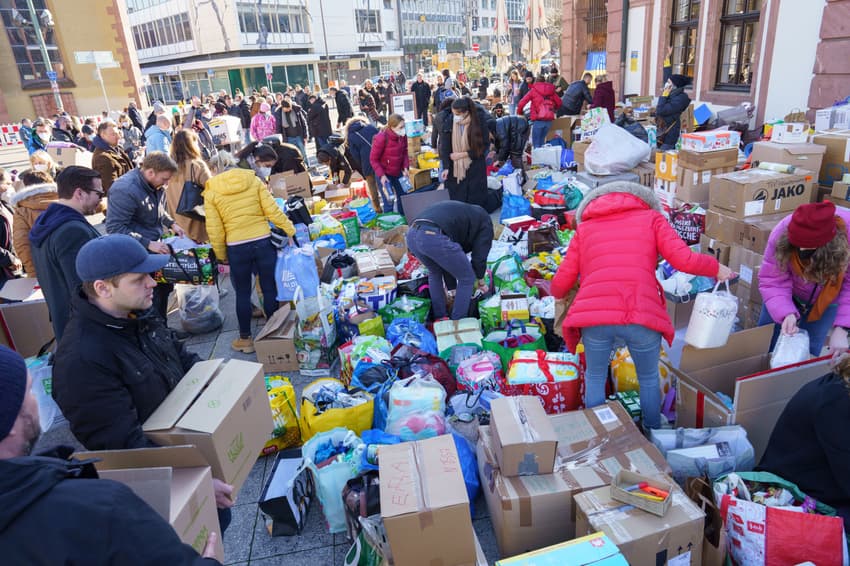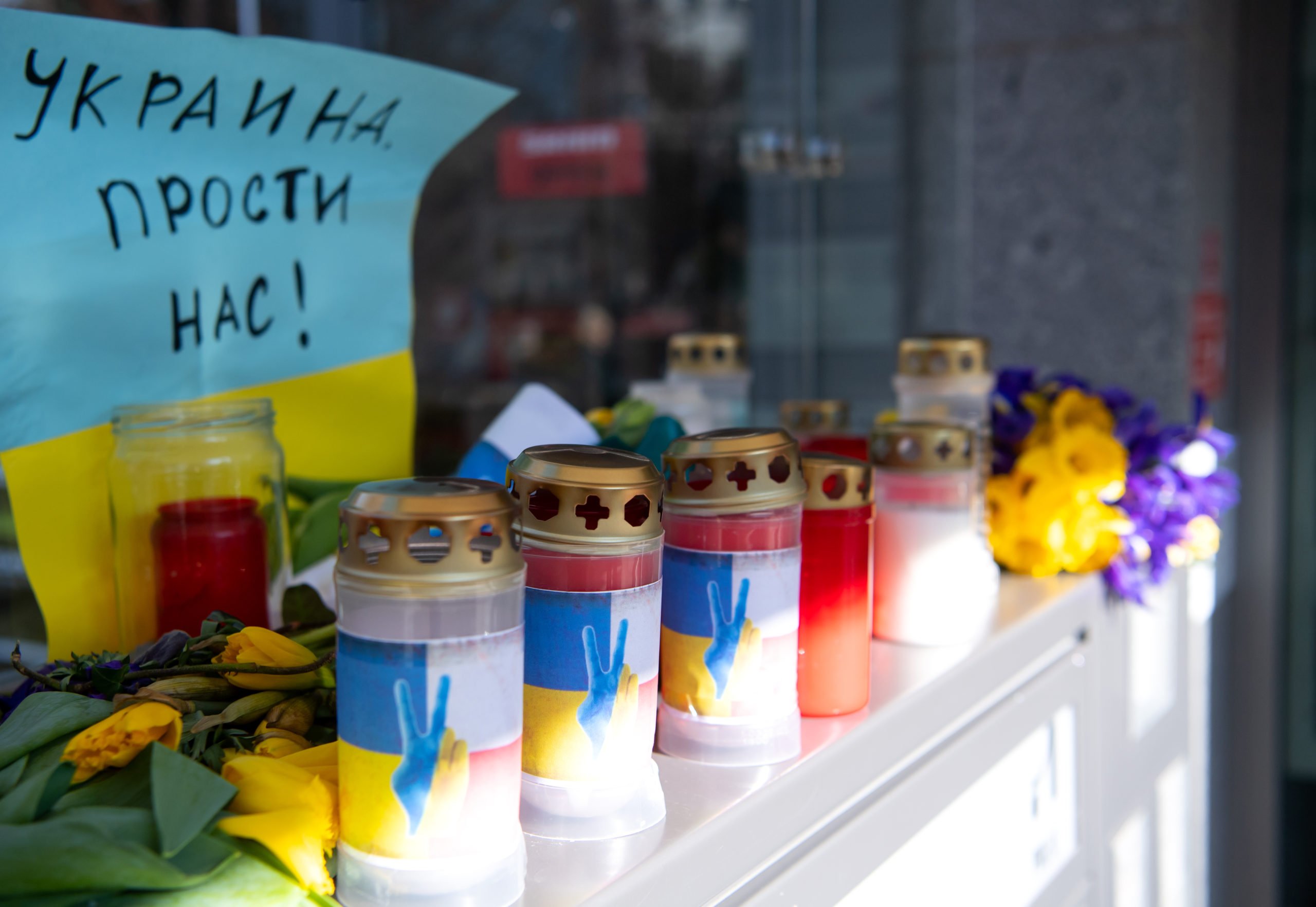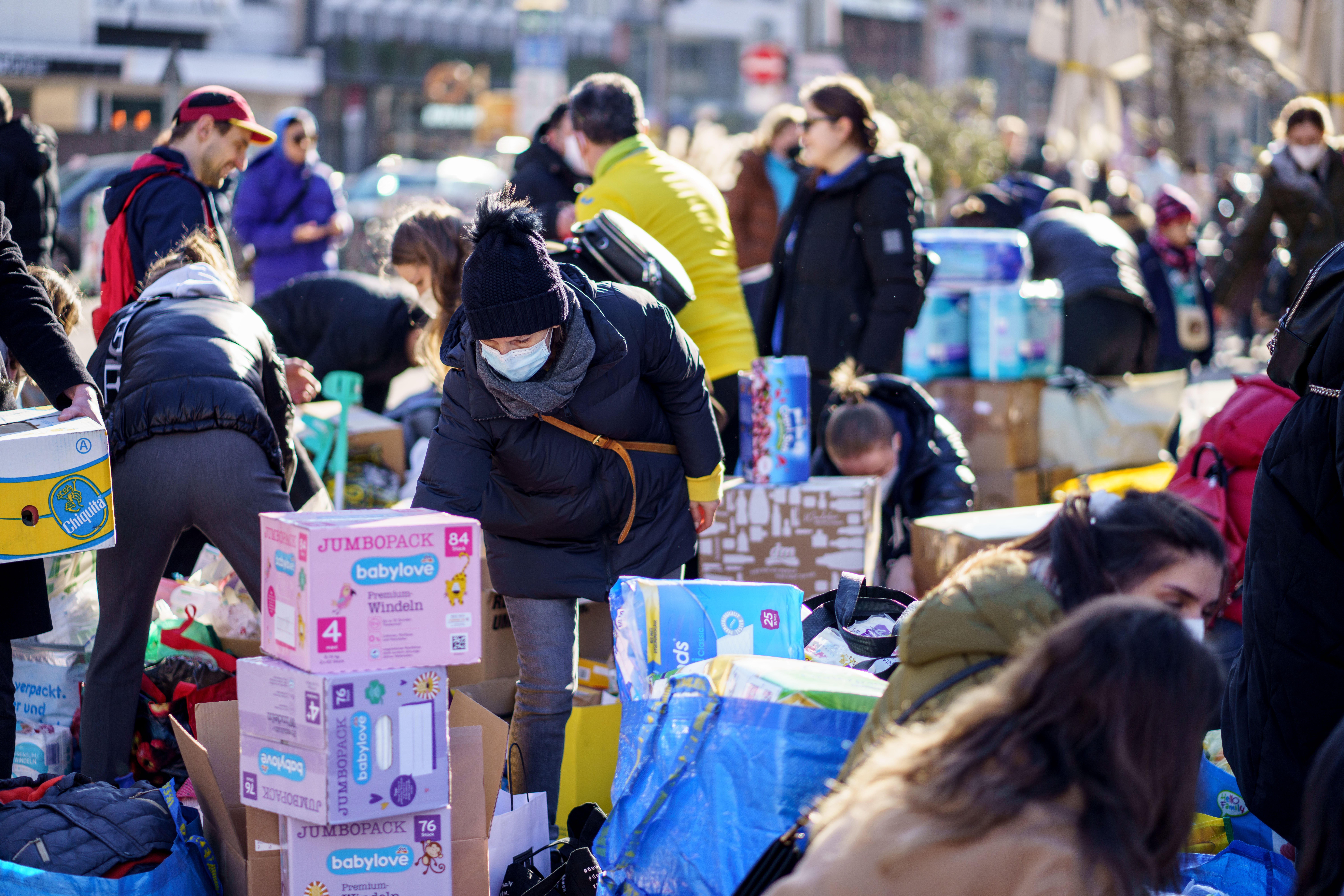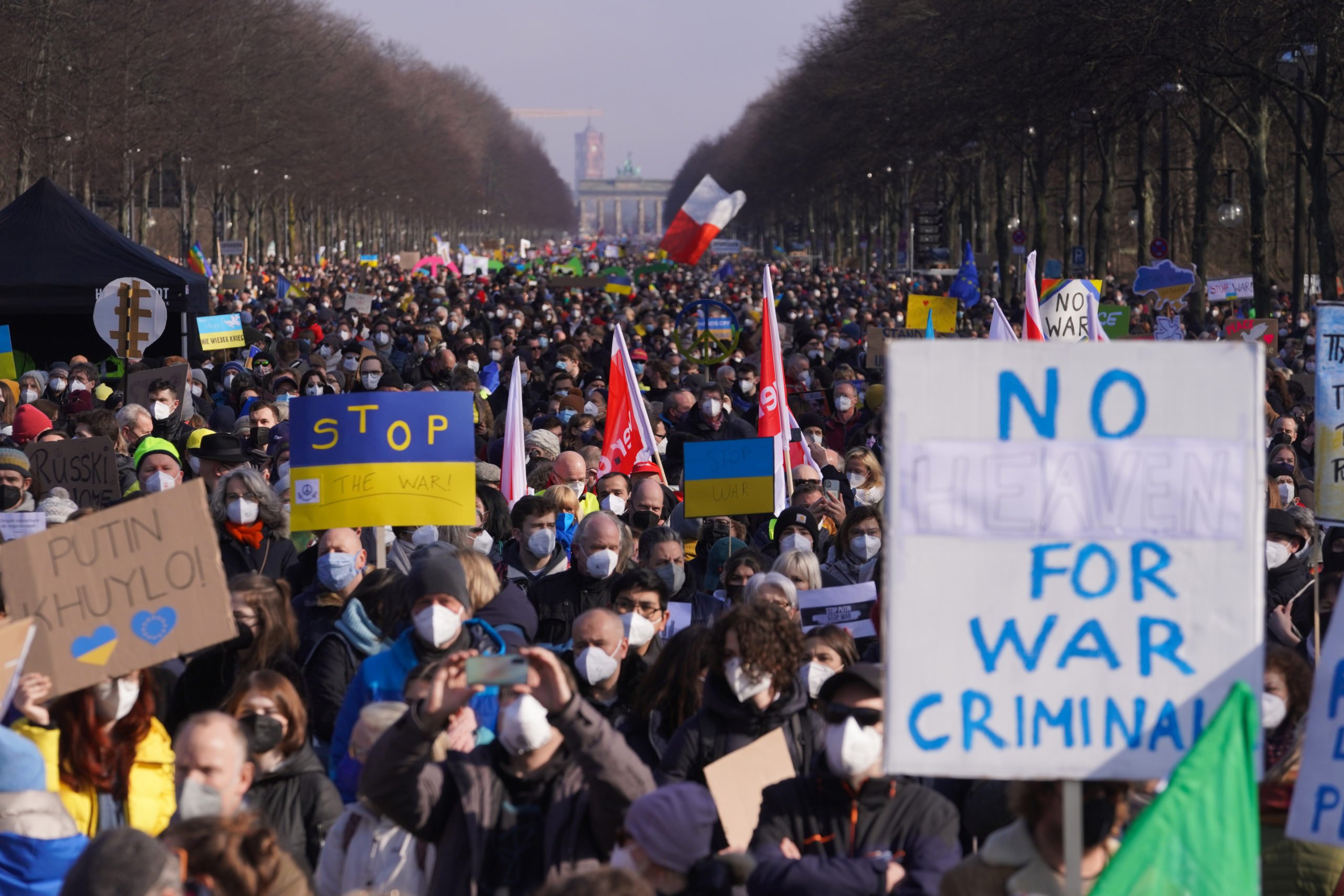How people in Germany can support Ukraine

Watching unprovoked war and suffering break out on European soil, many people are desperate to help - but it's hard to know how from a distance. Here's a few ways that people in Germany can support Ukraine and its people.
For the past week, it's been hard to look away from the brutal war unfolding in a country less than 800km away from Germany's borders. Devastating scenes of destruction and human suffering, fears of the conflict escalating and worries for any friends and family in Ukraine have given many of us the habit of non-stop doom-scrolling, while feeling utterly powerless to stop it from happening.
Though we may not control access to the SWIFT banking system or warehouses full of military supplies, there are many real and direct ways for individuals to support the people of Ukraine and their fight for democracy. Here are a few of them.
Make a donation
This is one of the quickest and easiest ways to support Ukraine, and though trying to choose where to place your money can feel a bit overwhelming, a donation to any of the below - no matter how small - is likely to make a difference.
If you want to focus on supporting injured or vulnerable civilians, the German Red Cross (DRK) has expanded its operations into the Ukraine for precisely this reason. According to DRK, they're currently looking for donations to buy medicine and supplies for injured civilians in particular. You can find their English-language donations page here.
Another good organisation for supporting Ukrainian civilians is Caritas. According to their website, donations go directly to their partner organisation in the Ukraine and will assist with supplies for people fleeing war-torn areas, including food, medicine, blankets, beds and water. Trained mental health workers are also there to help people process the trauma they've experienced. You can find details of how to donate online here (in German).

Flowers and candles lie outside the Ukrainian Consulate General in Munich on Monday. Photo: picture alliance/dpa | Sven Hoppe
Doctors Without Borders are also active in Ukraine, offering consultations and psychological support, as are UNICEF and SOS-Kinderdörfer Weltweit, two organisations dedicated to helping families and children fleeing the crisis.
To support the Ukrainian military directly, you can donate to Army SOS, which buys the supplies the army needs (including things like radio sets, uniforms, supplies and ammunition) and promises to deliver them straight to the front lines. You can also donate to the army via a special fund set up by the National Bank of Ukraine and to Come Back Alive, a foundation set up to support the Ukrainian military with by purchasing essential equipment like body armour and helmets.
We also rely heavily on journalists in the Ukrainian warzones to be on right side of the war of information being fought by Vladimir Putin and his ilk. To support Ukrainian journalism, you can donate here or at this Gofundme page that will help the media keep going during the crisis.
For a fuller list of organisations collecting and acception donations to help the Ukraine, check out the 'How to help Ukraine' website.
READ MORE: How you can help Ukrainian media
Buy things directly
This is a bit trickier and will probably need to be coordinated within your community, but if you can find reliable reports about what the military and civilians most urgently need, purchasing these items yourself and ensuring their delivery to the Ukrainian border could be as useful as a monetary donation.
A recent post by a volunteer on Facebook suggested that medicine, first aid kits, hygiene articles, food, sleeping bags, balaclavas, thermal clothing and radio sets are needed and can be dropped off at various collection points in major German cities such as Berlin, Cologne and Düsseldorf to be taken to Ukraine. In Düsseldorf, for example, the Ukrainian Consulate General and Ukrainian Catholic Church are apparently accepting donations, while some Cologne-based donations are being organised by the German-Ukrainian organisation the Blue and Yellow Cross. You can find more details of those here.
There was also a recent collection for refugees held in central Frankfurt am Main, which garnered incredible support. Now, a company called RP Group has published this shout-out for donations to be delivered to Langewiesenweg 37 in Oberursel. These will be delivered to Poland in support of fleeing refugees. More centrally, people can deliver items to this donation point, which is running every day in the afternoon (13-18) until Friday, March 4th, at the DJR Bildungs und Kulturzentrum on Sonnentaustraße 28 in Frankfurt.

Volunteers sort out donations for Ukrainians at a collection point in Frankfurt am Main on Sunday. Photo: picture alliance/dpa | Frank Rumpenhorst
According this Facebook event, Berliners can take donations to the Pilecki Institute, Pariser Platz 4A, Berlin, between 10 and 6pm each day. At present, they say that sleeping bags and mats are the most crucial thing, as people are sleeping in cold cellars. However, donations of power banks, first-aid kits, head and hand torches and clothes are also welcome. On the weekend of March 5th and 6th, the Humboldt Forum is also running a collection for Ukrainians stuck in the warzone. For those in the west of the city, STUDIO183 BIKINI Berlin is also collecting donations from 12-7pm on weekdays and from 11am-8pm on Saturday. They say they need bottled water, long-lasting food, sanitary products like tampons and tissues, cosmetics like toothpaste and shampoo, and blankets, pillows and toys for children.
You can also join two Telegram groups - @ukrainehelpberlin, @ukraineberlinarrivalsupport - where you can hear about opportunities to support Ukrainians arriving in Berlin or others in need, and sign up as a volunteer here.
If you're unsure of where to go in your own city, look for Ukrainian organisations and groups in your area and reach out to them to ask if they know of donation points, or shout out on social media channels such as Facebook asking if anyone knows where supplies can be taken and what is most needed at the moment. You can also search for keywords like "Sammelstelle Ukraine" (Ukraine collection point), plus the name of your area, to see what pops up.
If you can, it's best to try and find something organised by an existing association (Verein) or group to ensure the collections are legitimate and effective. If you're really stuck and aren't sure if there's anything in your area, you can always get in touch with The Local and we will try our best to give you a hand.
Join a solidarity protest
It may feel indirect compared to handing over physical aid at a collection point, but getting out on the streets in a show of solidarity with the people of Ukraine is a vital part of the picture.
On Sunday, an estimated 100,000 demonstrators gathered in the centre of Berlin in an outpouring of support for the nation and its people, declaring their commitment to peace, and demanding an appropriate response from the government. There have also been protests featuring around 250,000 people in Cologne, more than 100,000 in Hamburg, and around 45,000 in Munich.
Not only is it crucial at this juncture to show Ukraine the world is with them, but protesting is also a good way of channeling pent up frustration, anger or sadness into something productive and connecting with other people who are feeling the same way.
READ ALSO: IN PICTURES: Over 100,000 march for Ukraine in German capital

People walk down Straße des 17. June in Berlin during a demo in support of Ukraine on February 27th, 2022. Photo: picture alliance/dpa | Jörg Carstensen
Offer accommodation and support refugees
If you have any spare room in your house or apartment or are going away for a short time, there are various ways to offer it to refugees from the Ukraine. The first is Elinor, which is helping to connect refugees with any private rooms that can be offered for a duration of at least two weeks. Another option is Ukraine Take Shelter, an international initiative to source private accommodation for people fleeing Ukraine. You can also offer space in your flat or other forms of support using this online document that was recently shared by Tagesspiegel, though it's unclear who set it up.
An alternative online form explicitly opens up the offer of support to people who may not be white or European, or who may be LGBTQ and could therefore find it harder to find a welcoming home. Again, it's unclear who the author of the form is, but the survey description claims they are look to find people who can offer "inclusive space for vulnerable people that might not find shelter somewhere else". Another option for supporting ethnic-minority refugees in Berlin is to contact the Tubman Network at [email protected] and offer a room in your flat. You'll need to provide details of your full name, address, phone number, number of sleeping places available, dates offered and the languages you speak.
For anyone based in or around Frankfurt, a new group on Telegram - Hosting Ukrainians in Frankfurt am Main - has been set up to help connect refugees with people in the city who are able to host them.
Another option for registering your interest as a host or offering more general services as a volunteer to support people fleeing Ukraine is the website Help People Leave Ukraine.
If you can't offer somewhere directly (or even if you can), there are some less direct ways you can help asylum seekers.
One is by donating to refugee organisations such as Albatros or UNO Flüchtlingshilfe. Another is by writing to a local politician or politician in your home country to let them know you would like refugees to be welcomed in your area. The EU has already said it will grant Ukrainian asylum seekers refuge for a minimum of three years, but airing your support may also be useful so that politicians realise that public opinion is on their side.
There are also countries such as the UK that so far haven't committed to taking Ukrainian refugees on a visa-free basis, so if you're a Brit in Germany, it may be worth writing to your former local MP to campaign on this issue.
READ ALSO: EU warns bloc nations to brace for millions of Ukraine refugees
Push for an appropriate response
This one may take some reading up on, but if you're passionate about, for example, toughening sanctions on Russia or ensuring a more robust response to the crisis from politicians, companies or sports teams you follow, it doesn't hurt to put pressure on them. For some really useful information on staying informed and understand the war, we highly recommend this article by Global Citizen, which will guide you through some trustworthy news sources to follow as well as documentaries, podcasts and articles for background on the conflict.
If you feel compelled to reach out to an MP, sports club or brand, try tweeting them or writing to them directly to express your opinion. Of course, it's best to do this politely and by stating a few key grounds for your opinions and asking them to take the action you propose, rather than having a rant (though that can feel very cathartic).
If you think an issue is being overlooked or needs a greater response from the public and politicians, you can also set up online petitions directly via the Bundestag website or indirectly on sites like Avaaz.org and Change.org.
READ ALSO: Swift banking: How would Germany’s ban sanction Russia?
Anything we've missed?
If you're organising aid for Ukraine or think we've missed something important in this article, please let us know by emailing [email protected].
Comments
See Also
For the past week, it's been hard to look away from the brutal war unfolding in a country less than 800km away from Germany's borders. Devastating scenes of destruction and human suffering, fears of the conflict escalating and worries for any friends and family in Ukraine have given many of us the habit of non-stop doom-scrolling, while feeling utterly powerless to stop it from happening.
Though we may not control access to the SWIFT banking system or warehouses full of military supplies, there are many real and direct ways for individuals to support the people of Ukraine and their fight for democracy. Here are a few of them.
Make a donation
This is one of the quickest and easiest ways to support Ukraine, and though trying to choose where to place your money can feel a bit overwhelming, a donation to any of the below - no matter how small - is likely to make a difference.
If you want to focus on supporting injured or vulnerable civilians, the German Red Cross (DRK) has expanded its operations into the Ukraine for precisely this reason. According to DRK, they're currently looking for donations to buy medicine and supplies for injured civilians in particular. You can find their English-language donations page here.
Another good organisation for supporting Ukrainian civilians is Caritas. According to their website, donations go directly to their partner organisation in the Ukraine and will assist with supplies for people fleeing war-torn areas, including food, medicine, blankets, beds and water. Trained mental health workers are also there to help people process the trauma they've experienced. You can find details of how to donate online here (in German).

Doctors Without Borders are also active in Ukraine, offering consultations and psychological support, as are UNICEF and SOS-Kinderdörfer Weltweit, two organisations dedicated to helping families and children fleeing the crisis.
To support the Ukrainian military directly, you can donate to Army SOS, which buys the supplies the army needs (including things like radio sets, uniforms, supplies and ammunition) and promises to deliver them straight to the front lines. You can also donate to the army via a special fund set up by the National Bank of Ukraine and to Come Back Alive, a foundation set up to support the Ukrainian military with by purchasing essential equipment like body armour and helmets.
We also rely heavily on journalists in the Ukrainian warzones to be on right side of the war of information being fought by Vladimir Putin and his ilk. To support Ukrainian journalism, you can donate here or at this Gofundme page that will help the media keep going during the crisis.
For a fuller list of organisations collecting and acception donations to help the Ukraine, check out the 'How to help Ukraine' website.
READ MORE: How you can help Ukrainian media
Buy things directly
This is a bit trickier and will probably need to be coordinated within your community, but if you can find reliable reports about what the military and civilians most urgently need, purchasing these items yourself and ensuring their delivery to the Ukrainian border could be as useful as a monetary donation.
A recent post by a volunteer on Facebook suggested that medicine, first aid kits, hygiene articles, food, sleeping bags, balaclavas, thermal clothing and radio sets are needed and can be dropped off at various collection points in major German cities such as Berlin, Cologne and Düsseldorf to be taken to Ukraine. In Düsseldorf, for example, the Ukrainian Consulate General and Ukrainian Catholic Church are apparently accepting donations, while some Cologne-based donations are being organised by the German-Ukrainian organisation the Blue and Yellow Cross. You can find more details of those here.
There was also a recent collection for refugees held in central Frankfurt am Main, which garnered incredible support. Now, a company called RP Group has published this shout-out for donations to be delivered to Langewiesenweg 37 in Oberursel. These will be delivered to Poland in support of fleeing refugees. More centrally, people can deliver items to this donation point, which is running every day in the afternoon (13-18) until Friday, March 4th, at the DJR Bildungs und Kulturzentrum on Sonnentaustraße 28 in Frankfurt.

According this Facebook event, Berliners can take donations to the Pilecki Institute, Pariser Platz 4A, Berlin, between 10 and 6pm each day. At present, they say that sleeping bags and mats are the most crucial thing, as people are sleeping in cold cellars. However, donations of power banks, first-aid kits, head and hand torches and clothes are also welcome. On the weekend of March 5th and 6th, the Humboldt Forum is also running a collection for Ukrainians stuck in the warzone. For those in the west of the city, STUDIO183 BIKINI Berlin is also collecting donations from 12-7pm on weekdays and from 11am-8pm on Saturday. They say they need bottled water, long-lasting food, sanitary products like tampons and tissues, cosmetics like toothpaste and shampoo, and blankets, pillows and toys for children.
You can also join two Telegram groups - @ukrainehelpberlin, @ukraineberlinarrivalsupport - where you can hear about opportunities to support Ukrainians arriving in Berlin or others in need, and sign up as a volunteer here.
If you're unsure of where to go in your own city, look for Ukrainian organisations and groups in your area and reach out to them to ask if they know of donation points, or shout out on social media channels such as Facebook asking if anyone knows where supplies can be taken and what is most needed at the moment. You can also search for keywords like "Sammelstelle Ukraine" (Ukraine collection point), plus the name of your area, to see what pops up.
If you can, it's best to try and find something organised by an existing association (Verein) or group to ensure the collections are legitimate and effective. If you're really stuck and aren't sure if there's anything in your area, you can always get in touch with The Local and we will try our best to give you a hand.
Join a solidarity protest
It may feel indirect compared to handing over physical aid at a collection point, but getting out on the streets in a show of solidarity with the people of Ukraine is a vital part of the picture.
On Sunday, an estimated 100,000 demonstrators gathered in the centre of Berlin in an outpouring of support for the nation and its people, declaring their commitment to peace, and demanding an appropriate response from the government. There have also been protests featuring around 250,000 people in Cologne, more than 100,000 in Hamburg, and around 45,000 in Munich.
Not only is it crucial at this juncture to show Ukraine the world is with them, but protesting is also a good way of channeling pent up frustration, anger or sadness into something productive and connecting with other people who are feeling the same way.
READ ALSO: IN PICTURES: Over 100,000 march for Ukraine in German capital

Offer accommodation and support refugees
If you have any spare room in your house or apartment or are going away for a short time, there are various ways to offer it to refugees from the Ukraine. The first is Elinor, which is helping to connect refugees with any private rooms that can be offered for a duration of at least two weeks. Another option is Ukraine Take Shelter, an international initiative to source private accommodation for people fleeing Ukraine. You can also offer space in your flat or other forms of support using this online document that was recently shared by Tagesspiegel, though it's unclear who set it up.
An alternative online form explicitly opens up the offer of support to people who may not be white or European, or who may be LGBTQ and could therefore find it harder to find a welcoming home. Again, it's unclear who the author of the form is, but the survey description claims they are look to find people who can offer "inclusive space for vulnerable people that might not find shelter somewhere else". Another option for supporting ethnic-minority refugees in Berlin is to contact the Tubman Network at [email protected] and offer a room in your flat. You'll need to provide details of your full name, address, phone number, number of sleeping places available, dates offered and the languages you speak.
For anyone based in or around Frankfurt, a new group on Telegram - Hosting Ukrainians in Frankfurt am Main - has been set up to help connect refugees with people in the city who are able to host them.
Another option for registering your interest as a host or offering more general services as a volunteer to support people fleeing Ukraine is the website Help People Leave Ukraine.
If you can't offer somewhere directly (or even if you can), there are some less direct ways you can help asylum seekers.
One is by donating to refugee organisations such as Albatros or UNO Flüchtlingshilfe. Another is by writing to a local politician or politician in your home country to let them know you would like refugees to be welcomed in your area. The EU has already said it will grant Ukrainian asylum seekers refuge for a minimum of three years, but airing your support may also be useful so that politicians realise that public opinion is on their side.
There are also countries such as the UK that so far haven't committed to taking Ukrainian refugees on a visa-free basis, so if you're a Brit in Germany, it may be worth writing to your former local MP to campaign on this issue.
READ ALSO: EU warns bloc nations to brace for millions of Ukraine refugees
Push for an appropriate response
This one may take some reading up on, but if you're passionate about, for example, toughening sanctions on Russia or ensuring a more robust response to the crisis from politicians, companies or sports teams you follow, it doesn't hurt to put pressure on them. For some really useful information on staying informed and understand the war, we highly recommend this article by Global Citizen, which will guide you through some trustworthy news sources to follow as well as documentaries, podcasts and articles for background on the conflict.
If you feel compelled to reach out to an MP, sports club or brand, try tweeting them or writing to them directly to express your opinion. Of course, it's best to do this politely and by stating a few key grounds for your opinions and asking them to take the action you propose, rather than having a rant (though that can feel very cathartic).
If you think an issue is being overlooked or needs a greater response from the public and politicians, you can also set up online petitions directly via the Bundestag website or indirectly on sites like Avaaz.org and Change.org.
READ ALSO: Swift banking: How would Germany’s ban sanction Russia?
Anything we've missed?
If you're organising aid for Ukraine or think we've missed something important in this article, please let us know by emailing [email protected].
Join the conversation in our comments section below. Share your own views and experience and if you have a question or suggestion for our journalists then email us at [email protected].
Please keep comments civil, constructive and on topic – and make sure to read our terms of use before getting involved.
Please log in here to leave a comment.